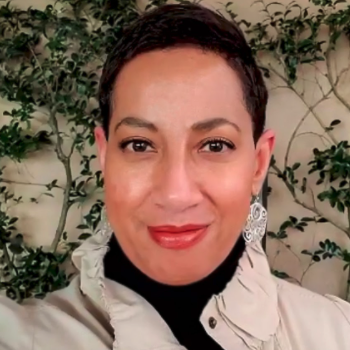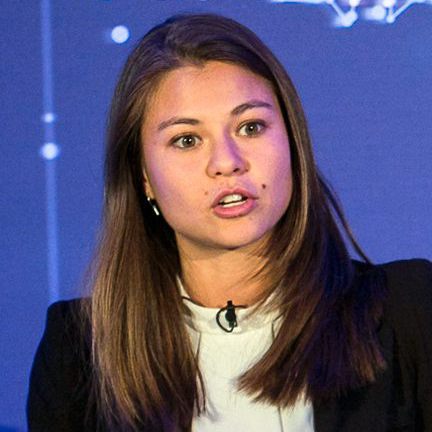< Back to all episodes
Shaady Salehi
Shaady Salehi: Tackling Common Misconceptions about Trust-Based Philanthropy
This episode of Impact Audio features Shaady Salehi, Director of the Trust-Based Philanthropy Project, discussing the importance of trust-based practices in grantmaking and unpacking some prevalent myths about the work

Shaady Salehi: Tackling Common Misconceptions about Trust-Based Philanthropy
Join Submittable and special guest Shaady Salehi digging into the tenets behind trust-based philanthropy and how funders may misunderstand them.
Description:
Trust-based philanthropy is becoming increasingly well-known among grantmakers—but do funders really understand how to incorporate the values and tenets of this movement in an effort to shift power?
The fourth episode of Impact Audio focuses on common misconceptions about trust-based grantmaking, with insight from Shaady Salehi, Director of the Trust-Based Philanthropy Project. Launched in January of 2020, this project is a peer-to-peer advocacy and learning initiative dedicated to making trust-based practices the norm in the philanthropic sector.
In this episode, you’ll learn:
What inspired (and demanded) the trust-based movement
Why trust doesn’t imply negligence or endanger compliance
What real support and genuine relationships look like
Why equity and trust-based philanthropy are not the same thing
The difference between crisis response and long-term relationship-building
Drawn from a longer conversation on the values behind trust-based philanthropy, as well as strategies and tech tips, these excerpts include key learning for better grantmaking. We hope you enjoy listening.
Guest:

Shaady Salehi
Shaady Salehi is a strategist, facilitator, and network builder who has dedicated nearly 20 years to the nonprofit sector. She currently serves as the director of the Trust-Based Philanthropy Project, a 5-year learning and advocacy initiative to make trust-based practices the norm in the philanthropic sector. She is also Principal and Founder of Skyview Strategies, a social impact consultancy for nonprofits, foundations, and changemakers. Her work in the nonprofit sector has spanned many roles -- from department head, to executive director, to board member -- and her main body of work has centered on using film, media, and strategic communications to advance social change.
Transcript:
Episode Notes
Learn more:
Stream the full webinar: Redistributing Power in Philanthropy: A Conversation with Shaady Salehi
Read about the Trust-Based Philanthropy Project
Interested in more quality content focused on trust-based philanthropy? Here are a few Submittable resources:
Improve Equity with #FixTheForm (Webinar)
The Review (Bi-monthly newsletter by Sam Caplan)
Full Transcript
Welcome to Submittable’s Impact Audio. I’m Rachel Mindell. Impact Audio features short conversations (and a few longer ones) with social impact experts and practitioners. We cover the world of philanthropy, nonprofits, corporate citizenship, and social change.
This episode is drawn from a webinar Submittable hosted on the power of trust-based philanthropy to help address the inherent power imbalances in the sector.
Today you’ll hear from Shaady Salehi, a strategist, facilitator, and network builder who has dedicated nearly 20 years to the nonprofit sector. She currently serves as director of the Trust-Based Philanthropy Project, a five-year learning and advocacy initiative to make trust-based practices the norm.
We spoke with Shaady about the tenets of trust-based philanthropy, dissecting some of the myths surrounding the practice. She explains the impetus of the trust-based movement itself.
***
Shaady
The need that emerged in creating the space for trust-based philanthropy is that there's a values-to-practice gap that exists in our sector.
If you think about it, many of us who work in philanthropy are in the work for good reasons. We're here to advance equity, advance fairness, increase opportunity for people who might not have access. So all these things are kind of these positive intentions behind what drives philanthropy. But oftentimes when you dig beneath the surface, the practices that we deploy don't really match with those same values. And somehow over the course of the last several decades, philanthropy has reinforced this very heavy compliance-oriented culture where funders are kind of set up as the omnipotent experts and nonprofits have to kind of fit themselves into boxes to appease the funders. Nonprofits are held accountable to funders instead of being accountable to the work that they're doing. And so there's all these dynamics that have been set up. And these power imbalances show up in a lot of traditional philanthropic practices.
***
Though many funders know that trust-based philanthropy can help right some of these power imbalances, myths about the practice can dissuade organizations from adopting this approach. We’ll take a look at a few.
Myth #1: Trust-based philanthropy is about handing over the money and walking away.
Shaady explains that the trust-based approach is in fact, based on building strong relationships.
***
Shaady
The misperception of trust based philanthropy is that, oh, are you just writing a check and walking away and you never know what happened? Actually, no. There's a lot of rigor in the relationship building that can exist and be built when you alleviate some of these burdens on nonprofits. So it's actually also a mutually beneficial experience where funders actually get deeper information about what's going on. They're kind of getting deeper learnings about the work.
***
Shaady explains what it means to provide support beyond the check, one of the core values behind trust-based philanthropy.
***
Shaady
Of course, financial support is huge and critical to the work that nonprofits do. But the support beyond the check piece acknowledges that as funders, regardless of the role that you play in your foundation, we have access to all this other stuff that can be supportive of nonprofits.
And some of that is really, really basic, like moral support. I know that when COVID hit a number of trust-based funders literally sent individual emails to their grantees saying, hey, we know this is a hard time, we're thinking of you. Let us know if there's anything we can do. Just really simple, just kind of an email like, we see you. We're with you. We're here to talk if you need it.
It can also be something like sitting on the advisory committee of a nonprofit partner. It could be supporting a nonprofit through a challenging leadership transition or sending them resources that you come across. That might be something that they could use.
It could be technical support like access to marketing experts or branding if you see that they have the need for that.
But it can also be just one of the biggest things that you can do as a funder is that you know other funders. So opening doors to other funders, promoting your grantee’s work in different ways, celebrating them, centering them and how you're talking to other funders, because, again, especially when you look at people-of-color-led organizations, youth-led organizations, you know, emerging organizations. They don't have those types; they don't have that kind of access. And that kind of access and networking is so key to how fundraising happens and how this work gets done. And so recognizing that you've got connections that you can deploy on behalf of your grantee partners, because ultimately this work is about partnering in a spirit of service to those partners.
***
Shaady also discusses how to approach these relationships.
***
Shaady
At the end of the day, everything we do is contingent upon these relationships, no matter what it is—business, social impact work. We rely on relationships to get the work done. So how can we actually center relationships more fully and more intentionally in how we do all of the work that we do?
Connected to that is this notion of collaborating and not just collaborating just for the sake of collaborating, but actually collaborating with the lens of humility, recognizing that we don't have all the answers and curiosity where we can actually be open to learning from the grantee partners that we're working with and those who are in the fields that we're supporting. So how can we be more curious and approach collaboration from a place of curiosity?
***
The focus on removing burdens for grantees leads to Myth #2: In trust-based philanthropy funders have to be okay with not knowing much about their grantees.
Shaady explains why the trust-based approach is not about leaving funders in the dark, it’s about shifting some of the responsibility of providing information away from the grantee. She gives guidance to funders.
***
Shaady
Do the homework. This means that some of the onus is on the funder to do some of the due diligence, getting to know the prospective grantees, getting to know the issues that they're funding within and understanding the ecosystem. So it's kind of like a two-part thing here. First part is do the homework on the issue or the field or the community that you are invested in supporting. Understand the players and dig deep; go beyond your usual circles to understand who is doing work on this issue.
This is a really important piece because oftentimes you'll have, like, the funder darlings that always get the grant and then there's sometimes that really does not create space for new and emergent efforts. So it should be on—the onus—should be on funders that are invested in those issues to do some of that homework.
The other part of this is how can funders do the homework on prospective grantees and not ask questions that are already publicly available? For example, 990s are publicly available. That data is out there. So why ask for financial data when some of that stuff is out there? Also really basic stuff like board composition, board names, board bios. There's sometimes these kind of—even in the LOI process, nonprofits are required to submit all this extra information just to be considered to submit a proposal. And you think about all this pre-work the nonprofits have to do just to be considered to submit a proposal. That's tons of time that they're putting into the work that's unfunded. And it doesn't even guarantee any prospective funding.
***
Because trust-based philanthropy attempts to remove barriers, it’s easy to believe that equity is baked into this approach. That leads us to Myth #3: Trust-based philanthropy is naturally equitable.
Shaady explains the limit of trust-based philanthropy if it’s not based on a foundation of self-reflection and humility.
***
Shaady
You can be out there and be giving unrestricted, multi-year grants. But if you're not kind of rooted in these values of equity and power awareness and systemic power analysis, I know these are like heady things. But if you're not rooted in that, then it's not—you're really not trust based because you're only trusting some people. You're not really. And so there's a lot there. So I think that's the key, is the self-reflection. Funders that can do the work humbly and with a willingness to self reflect and learn and shift and make course changes and take the lead of nonprofits in informing those course changes. Those, to me, are the qualities that make a, you know, a great trust-based funder.
***
Though the trust-based approach can help even the playing field, Shaady also explains why funders need to be rigorous in their pursuit of equity.
***
Shaady
There must be an equity lens to all of this work, you know. There's plenty of data out there about how white-led organizations have tremendously, on average, way more unrestricted reserves than black-led organizations. It's like 76% larger, unrestricted reserves. So you think about that. You think about, how have we as a sector kind of made assumptions about what makes an organization trustworthy and what makes it not so trustworthy? Or do we overvalue things like a really slick theory of change or like a really beautifully written proposal?
We need to look beneath the surface and actually get to know these leaders and check our own biases and what we think about what makes a nonprofit worthy of funding and not. We need to kind of check where those biases show up and recognize that things like really burdensome paperwork processes, really burdensome proposal processes, really leave out leaders who maybe don't have formal development writing training, or don't have a development director on staff or [are] volunteer run. And they're just kind of bootstrapping the whole thing and trying to advance a vision and have a clear vision, but haven’t gone through the whole formal kind of nonprofit industrial complex to know how to navigate this stuff.
So when you think about where we are as a society, we're not where we want to be, clearly. Every day there's a new headline that kind of reinforces that. So how can we as grantmakers, recognizing that we do sit in a position of power, how can we be intentional about recognizing how we can at least—how we have perpetuated some of that harm in the past and work intentionally to alleviate it by opening our minds to where those promising efforts are that haven't made it on the radar? And figuring out ways to make sure to do the homework to make sure that we know about that work.
***
In 2020, trust-based philanthropy allowed nonprofits to provide relief quickly during the pandemic, which leads us Myth #4: Trust-based philanthropy is best for crisis response.
Because of the strong relationships and low burden on grantees, the trust-based approach can be great for providing quick relief during a crisis. But deploying the trust-based tactics exclusively during a crisis obscures the ways it can improve the sector as a whole and get infrastructure in place to deal with future crises before they hit.
***
Shaady
The thing that I would really advise and caution is that trust-based philanthropy is not a crisis response strategy. It's a strategy of actually supporting nonprofit work and advancing the collective vision that we have. It's about nurturing and supporting the work that needs to happen regardless, because, one, we're still in the middle of a pandemic and worldwide, it's going to have ripple effects for a long time to come. We know. And secondly, we need to be prepared for the next crisis because there is going to be another crisis inevitably.
And how can we build the resilience of nonprofits in order to be able to do that and again, build relationships. So that when the next crisis happens, we can pick up the phone and literally ask them, OK, what do you need to address this thing and move more quickly? And in fact, foundations that already had a lot of their trust-based practices in place were able to respond more quickly to their nonprofits’ needs because of the transparency that had already been built. And that takes time.
So that's the other thing. It's like this isn't an overnight thing. It's ongoing. So I see possibility for the sector moving in this direction longer term. But it is important for those of you who are having these conversations with your teams about whether or not, if you made changes, whether or not you're going to stick with those changes, think about it.
Take a moment to reflect on what you've learned. Was it challenging? Did it alleviate some of the burdens on you internally if you kind of unrestricted certain grants or streamlined some processes? And what have you learned and what worked; why not stick with that? What would be the harm in sticking with some of these processes that you've made and/or put in place in response to crises? So I would encourage that kind of internal conversation, because ultimately, this is about–it's about resourcing the work and supporting the work, right. So the work is dynamic. Society is dynamic. Life is unpredictable. So how can we kind of build in processes that recognize that?
***
If you enjoyed these excerpts and want to hear more, please check out the links in our episode notes, including the full video conversation with Shaady.
Thank you for joining us. Impact Audio is edited and produced by Jordan Marvin and our crew at Submittable. Submittable is a cloud-based social impact platform designed to help your team make better decisions and have a bigger impact. We’d love to partner with you to maximize social good and create lasting change through smarter technology—find out more at Submittable.com. And until next time, take good care.
Additional Resources
Season 1 , Episode 1| 56 Min
Satonya Fair and Sam Caplan: Philanthropy, Impact, and the Future of Grantmaking

Sam Caplan

Satonya Fair
Season 1 , Episode 3| 12 Min
Luther Hughes and Lydia Boss: Antiracism, Community-building, and Grants for Artists

Luther Hughes

Lydia Boss
Season 1 , Episode 2| 14 Min
Louise Bleach and Mark Horoszowski: CSR, Social Enterprise, and Doing Well by Doing Good

Louise Bleach

Mark Horoszowski








